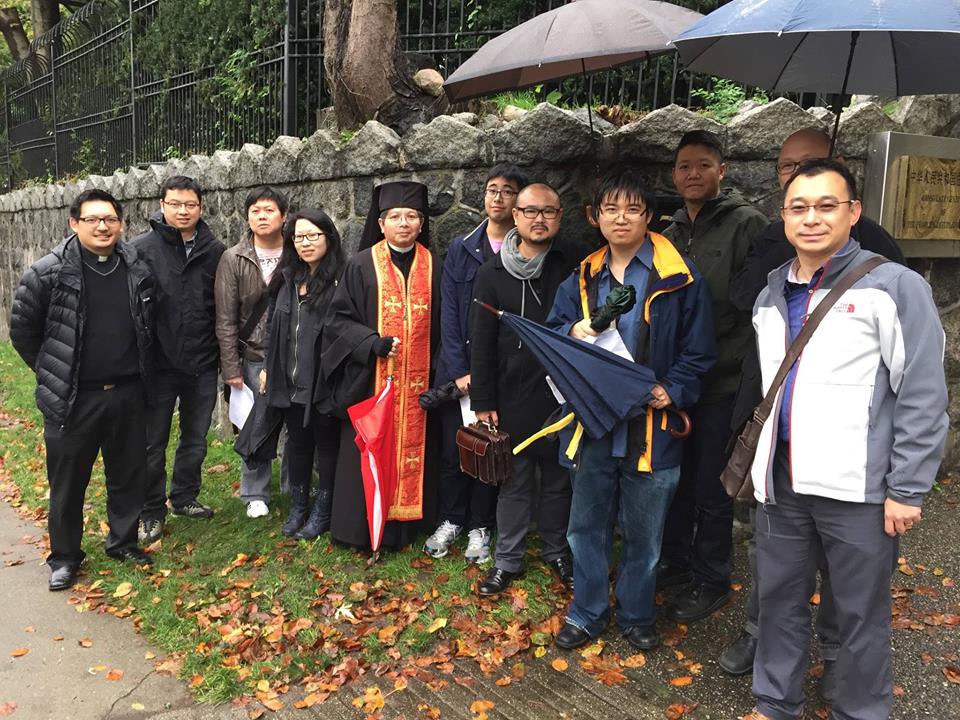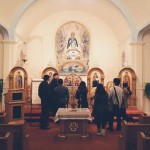
In my last post on first encountering a Chinese Canadian Eastern Catholic Jesuit priest at a prayer rally in solidarity with the Umbrella Movement, I ended on a bit of a cliffhanger on what happened after a bunch of Protestants penned an open letter on Chinese Christian social justice in Vancouver signed by our Patheos Catholic channel editor by quoting said Jesuit. In order to get to the Eastern Catholic theology that we began learning from discussion with him, I first have to talk about who we were: younger generation Chinese evangelical Protestants in Vancouver.
In many ways, penning those posts and writing that letter brought a number of us younger-generation Chinese evangelical clergy, lay leaders, and occasional interlopers (like me) in Vancouver together for some very intense conversations. By younger generation, of course, I mean that there is an older generation of Chinese evangelical pastors, lay leaders, and their circle’s interlopers, and regardless of how different we ‘younger’ folks are from each other, those of us ages 11-40 get categorized as ‘younger generation.’ I was in fact elated to find during my catechumenate that the Ukrainian Catholic Archeparchy of Winnipeg defines ‘youth ministry’ as ‘working with teenagers to young adults in their early 40s’; that was one less barrier to conversion from Chinese evangelicalism indeed.
Within this younger group, there is usually a de facto division between primary English-speakers whose congregations may not even be primarily ethnic Chinese, while others who speak mostly Cantonese try to evangelize Cantonese-speaking young people; though the Mandarin-speaking population is growing, younger-generation Mandarin-speaking pastors seem hard to come by (though my best man at my wedding is a notable exception). Generally, if your primary language is English, your youth gets extended at least to 50; whether the ‘young’ Cantonese group’s perceived adultness is because they have already had a very public sex scandal in Vancouver a few years ago whereas the English speakers have not yet had one is a detail we can parse another day.
The evangelical category here is also likewise broad, comprising anyone from the Christian and Missionary Alliance, the Evangelical Free Church, the Mennonite Brethren Conference, various Baptist conferences, the various Anglican churches (Anglicanism is split three ways in Vancouver), and non-denominational congregations. At this point, I was Anglican and agnostic about which split to which I belonged, but because Anglicans are Protestants, my evangelical friends simply considered me one of theirs with some liturgical quirks. Of course, the truth is that at that point, people had been saying that I was more Catholic than the Catholics for quite some time. Because I was also working as a postdoctoral fellow in Seattle, I spent a lot of time with Polish Dominicans in Seattle’s U-District, the students at the University of Washington who composed their main ministry (I divided my time between Seattle and Vancouver), and Latin Catholic friends like Sam Rocha, Artur Rosman, and Mark Shea who are now my Patheos colleagues. I suppose one could say that my evangelical friends’ perception of me has perhaps kept me honest about my having grown up Chinese evangelical (they remain persistent even now and seem to comprise some of my readership), but to fully work that out in relation to my flirtations as an Anglican at the time with Latin Catholicism will require sorting out more baggage than is possible in a blog post that is supposed to be about Eastern Catholicism.
What was intense about our Umbrella Movement discussions is that a small group of us younger generation Chinese Canadian evangelicals were for the first time having real theopolitical conversations. Sure, we had had conversations about Canadian politics before – and even American politics too – but up to this point, my friends seemed to believe (and I was raised this way too) that politics was mainly about political parties advancing their ideologies in compromised ways and that the church really shouldn’t get involved in partisan politics, which means that the ideal for a Christian talking about politics should be complete neutrality – especially for Christian leaders. Put another way, there was an equation in our practice between politics and the partisan such that all politics was about was the private interests of a party, which means that we all grew up thinking that the church should stay out of anything to do with politics because politics would make the church beholden to private partisan interests.
That politics was somehow a public affair was novel for us, which meant that the Umbrella Movement was a very subversive event for us, challenging that ideology of eccleisal neutrality to its core. Neutrality was simply a morally untenable orientation while watching the scenes of people demanding democracy in Hong Kong being met by brutal police tactics of firing 87 volleys of tear gas, pepper-spraying random people, and beating folks with batons. Conversations about such militarized policing was very much in the wind in 2014 – Kyiv, Taipei, Caracas, Ferguson, and even Gaza and Ayotzinapa – but to be honest, what was special about Hong Kong is that the simple fact of living in contemporary Vancouver since the 1986 Expo means that everyone – regardless of background – has some relationship with Hong Kong , whether imaginative or material. Despite the differences between English- and Cantonese-speaking younger generation people, we began having deep conversations about what it meant that we as Christians had to say something publicly about something so politicized, especially in light of having to write for the local paper to rebut claims that Chinese Christians don’t care about the Umbrella Movement.
This is where that Eastern Jesuit comes back into the picture. Because of the intensity of the Umbrella Movement, there were rallies in front of Vancouver’s Chinese Consulate every week for a time, and I managed to actually meet this Jesuit at yet another rally where he didn’t have so much of a prominent role. He gave me a ride home, and during the ride, I asked how how he became Eastern. ‘What do you mean how I became Eastern?‘ he quipped, as if it were obvious that Jesuits should be part of Eastern churches.
Of course, what I meant by that question – and by extension, what my younger generation Chinese evangelical friends were also asking – was: why are you not subject to the same kind of hand-wringing about the church’s involvement in politics as we are?
Indeed, we found out more a bit later about the full extent of this Eastern Jesuit’s ecclesial backing for doing what he did. It turns out that he had asked for his blessing from his local bishop to lead the prayer rally. His bishop had been in Ukraine at the very beginning of the Euromaidan protests just a few months before and wrote an enthusiastic ‘yes’ back with the words, ‘Of course, we can’t just be about Ukraine,’ along with the request to draft an ektenia petition for Hong Kong to be prayed by Ukrainian Catholic temples in the eparchy alongside their prayers for Ukraine. The Eastern Jesuit later told me that leading the prayer rally was almost like being part of what our hierarchs and presbyters had been doing at Maidan and that he had been truly inspired by the experience.
As younger generation Chinese evangelicals, our experience of Eastern Catholicism as we stood in solidarity with Hong Kong’s Umbrella Movement was thus inspiring because here was a church that had the guts to stand up as a church in solidarity with its people. A few weeks after the first prayer rally, the small group of us whose political consciousness had been awakened decided to host a second service in front of the Chinese Consulate. But the defiant picture that we took in front of the Chinese Consulate belies some of the handwringing that I began hearing about. One young Chinese Anglican priest had just been reprimanded the week before for simply praying for peace in Hong Kong, as a parish member assumed that he had taken a side in favour of the Umbrella Movement. Other pastors told us that they were at our clergy meeting at the risk of their own careers as their congregation members could interpret their actions as mixing religion and politics, an objection that these same congregation members never seem to have (of course) when discussing controversial sexuality issues. When the Chinese-language media came to cover the meeting, they asked me – the worst among the whole bunch in speaking professional Cantonese (I am a very vulgar person) – to speak to the media (I don’t think the piece ever ran) because they said that I had the most experience with ‘public stuff.’
In stark contrast to all of this was the Eastern Jesuit. I remember asking him to give an ‘Eastern Rite blessing’ to conclude our meeting; if there is one thing that evangelicals like to do, we like to get all of our culturally appropriate terms right with exact precision, which means that we tend to bungle every single one of them all the time, and in that sense, I was very evangelical at the time. The Eastern Jesuit didn’t mind my bungled terminology; in fact, he over-delivered. The first time we had seen him at the first prayer rally, he had simply been wearing a cassock, but for this one, he came out with full klobuk and epitrakhil. Not only did he bring an umbrella for Umbrella Movement solidarity, but he also brought out the three-barred Byzantine hand cross. Raising it high and then making reverences with it, he went into an extended concluding blessing that I cannot fully remember here – but I do remember it being quite long and – come to think of it – pretty standard now. Of course, none of us knew to go kiss the blessing cross afterward, which is too bad.
As I said in my last post, one of the major complaints raised in Hong Kong during the Umbrella Movement was that while many Christians were involved in the protest occupations, the churches tried to stay neutral. Out of frustration, several churches were either started on the street or gained a greater following, such as Narrow Church, Umbrella CyberChurch, and St Francis’ Chapel on the Street. A similar dynamic could be found across the Pacific among Vancouver’s Chinese evangelical churches, where some people – including clergy – gained a sort of political awakening from the Umbrella Movement, but their churches insisted on neutrality even in the face of social injustice and political corruption. For spiritual leadership, we had to look to an Eastern Jesuit whose entire church has the guts to align in solidarity with the people.
In other words, whereas our Chinese evangelical practice framed anything we were remotely nervous about as ‘partisan politics’ that we couldn’t get involved with – a framework that as I suggested is riddled with contradictions – we encountered a church through the Umbrella Movement that deeply understands the spirituality of solidarity. Of course, now that I have been received into the Kyivan Church, I certainly encounter some of this same hand-wringing about ‘partisan politics’ among our people even when no political parties are involved as well as a de facto alignment with the ‘Right’ (fragmented as that is) – Protestantism is certainly a difficult habit to break, especially for people who do not realize that they are more influenced by the artificial Protestant division between the sacred and the secular, as well as the private and the public, than they care to admit – but none of this changes my thinking on the wisdom and courage of our hierarchs and presbyters in standing up for social justice and solidarity with their people, especially in the most recent of times.
What accounts for this difference? For that, I’ll have to talk in the next post about a retreat on the Umbrella Movement that this Eastern Jesuit then organized at his temple, bringing us into the very house of G-d to teach us to discern the spirits with the wisdom of the ancient mothers and fathers of the church.












